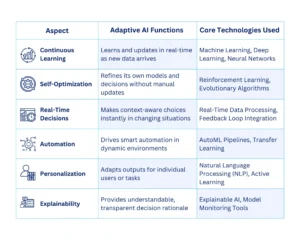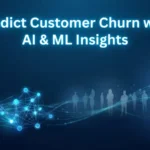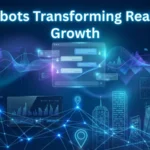Artificial intelligence is a dynamic and ever-evolving spectrum of technologies. In businesses, AI is helping increase operational efficiency. It is a little disappointing, though, that such highly smart systems also rely on manual intervention for updates. With adaptive AI, this does not remain a concern. Adaptive AI systems are capable of learning and improving their performance continuously through user interactions. Their adaptability offers better and more accurate results in businesses. The global adaptive AI market was valued at USD 1,013.2 million in 2024, which is going to rise with a CAGR of 2.8% and cross USD 1607 million by 2030. In this blog, we shall discover the adaptive AI use cases, benefits, and adoption strategy for an improved business.
What is Adaptive AI?
Adaptive AI is a type of artificial intelligence that can adapt, improve, and learn. Its learning can be stimulated by the environment, user interaction, or data, but it is totally automatic. The traditional AI technology would require manual updates and data training to feed new information to the system. Moreover, adaptive AI can also modify its behaviour and tone in context to the particular user behavior and query. These features make adaptive AI versatile for a range of industrial and business applications. So, if you are a business owner looking for a smart, adaptable, and tailored AI tool, you should get in touch with an adaptive AI development company and custom-build a smart AI system for your workflow.
How Does Adaptive AI Work?
Adaptive AI works by continuously improving its performance with every interaction. It does not require manual data feeding, training, or updates. It has streamlined the process of self-improvement. These enhancements take place in a cycle of data that includes data gathering to model evolution. Let us see the steps involved in its self-improvement cycle.
Key Steps in Adaptive AI
Data Ingestion:
The adaptive AI system collects raw data from various sources, such as the environment, user interaction, or real-time data. All this collected data is then used in the next step of the AI improvement cycle.
Data Validation:
In this step, the data is cleaned, validated, and labeled to ensure its quality, free from inconsistencies or biases. Clean data is necessary for unbiased and accurate results.
Pattern Recognition:
Sophisticated Machine learning algorithms analyze the data to identify trends, patterns, and anomalies. This helps in picking out details like hidden trends, possibilities, and probable concerns.
Decision Making:
Once the pattern recognition step is complete, the adaptive AI technology makes decisions or predictions based on the identified patterns.
Feedback Integration:
The adaptive AI system monitors the results of its decisions and integrates the feedback to refine its performance. Feedback integration helps AI systems adjust their parameters according to the new learnings.
Model Evolution:
With time, the adaptive AI solutions learn and make changes in their model and core behavior, integrating new findings and knowledge. Thus, the overall model is evolved without human intervention and repeated training.
This table summarizes the various aspects of adaptive AI and the core technologies utilized in those functions.

Special Features of Adaptive AI Technology
Before we learn about adaptive AI use cases, let us first see what features make it so special. Here are some of the special features or characteristics of adaptive AI technology.
-
Continuous Learning
Adaptive AI solutions are designed in a manner that they continuously learn, analyze new information, and identify patterns. Thus, it enhances and improves its performance over time.
-
Adaptability
Like its name, Adaptive AI solutions are highly adaptable. They understand the purchase behavior and queries from customers to provide personalized responses adapted to their personality.
-
Self-improvement
Adaptive AI, like ChatGPT, has the most special feature of continuous learning and improving its performance through user interaction.
-
Problem-Solving Capabilities
Adaptive AI use cases involve some nuanced approaches to different kinds of problems. It improves their ability to solve even complex problems with innovative solutions.
Adaptive AI Use Cases Across Industries
Adaptive AI is a versatile technology with multiple applications across different industries. It helps businesses enhance their operations in various ways. Let us see some industry-specific adaptive AI applications to understand their benefits better.
Adaptive AI in Healthcare
Adaptive AI technology helps reshape and improve the healthcare sector through 3 major applications. Here are the adaptive AI use cases in healthcare
-
X-ray and Visual Screening
Adaptive AI solutions are designed and trained to read and analyze visuals like X-rays and MRIs. It helps accurately identify any possible diseases and fractures. It allows the system to understand the patient’s medical history and calculate all relevant factors to provide accurate results.
-
Personalized Treatment Plans
Adaptive AI allows personalizing the treatment plans according to the patient’s lifestyle, habits, and medical conditions. This accelerates the patient’s recovery speed without medicine overdoses and also reduces side effect risks.
-
Faster Drug Discovery
One of the adaptive AI applications that has a revolutionary impact is its capacity to support faster drug discovery. Adaptive AI is being used in the medical industry for drug discovery and the development of new medicines. Through intelligent AI systems, the risk of human errors are reduced and accurate concentration of drugs can be achieved.
Adaptive AI Applications in Finance
The finance and banking sectors are often complex and strictly regulated fields. Adaptive AI plays an important role in its security, personalization, and compliance.
-
Active Fraud Tracking
The finance sector always needs better security and fraud detection solutions due to risks of monetary loss. Adaptive AI enables finance teams to actively track their systems, identify anomalies, and take a proactive risk management approach before a possible attack.
-
Personalized Product Suggestion
Adaptive AI suggests customers relevant insurance plans and financial services based on their history and preferences. This leads to more customer conversions.
-
Legal Compliances
The use of AI in regulatory compliance is rapidly increasing. Adaptive AI, when integrated into the system, tracks the evolving rules and regulations from the state and central government. Thus, it ensures that operations are in compliance with dynamic regulations all the time.
Adaptive AI Use Cases in Manufacturing
The manufacturing industry has several departments and hundreds of different processes. Most artificial intelligence technologies find a role in manufacturing processes. Generative AI in manufacturing is known for enabling rapid innovation, automation, and efficiency in organizations. On the other hand, predictive AI forecasts market conditions and trends to help optimize operations and make strategies accordingly. Similarly, adaptive AI plays an important role in the manufacturing industry by managing inventory, enhancing quality, and taking care of maintenance.
-
Inventory Management
Adaptive AI enables manufacturing businesses to monitor market trends and forecast future product demand. Thus, it makes manufacturing units optimize their production and strategize their distribution strategies in a manner that the stocks are optimum and there’s no waste.
-
Enhanced Quality
Adaptive AI uses cases in manufacturing include accurate quality testing in production to monitor damages, malfunctions, or missed products. Such products are removed from the distribution chain in real-time.
-
Frequent Maintenance
Adaptive AI’s innovative solutions help track equipment performance and detect maintenance requirements. In this manner, frequent maintenance of machines is ensured, and it reduces the risk of failures and bigger expenses.
Adaptive AI Applications in eCommerce
The e-commerce industry is heavily impacted by customer demands and market trends. With new-age consumers dominating the market, the need to reshape the industry emerges. Adaptive AI supports the technological transformation of the e-commerce industry by facilitating personalized recommendations, dynamic pricing, and advanced strategizing.
-
Personalized Recommendation
Adaptive AI solutions study the purchase patterns of customers, their lifestyles, and spending potential. This data is used by the system for personalized marketing to show relevant products and service ads. These strategic marketing and recommendation tactics help increase sales.
-
Dynamic Pricing
Pricing is an important aspect of staying competitive in today’s market. Adaptive AI adjusts the product prices according to the standard range in the market, competitors’ prices for similar products, and real-time market conditions. Thus, it ensures that despite competition and market ups and downs, the business keeps making a profit and acquires more customers.
-
Advanced Strategizing
One of the best adaptive AI use cases in the e-commerce industry is that it tracks market trends and allows businesses to optimize their operational strategies. Such data-based strategies are more effective and resonate with the target customer base.
Logistics and Transportation Industry Use Cases
The logistics and transportation industry requires a lot of real-time tracking and optimization. Adaptive AI offers the same with its advanced features. Some of the adaptive AI use cases in the logistics and transportation industry include:
-
Route Optimization
Adaptive AI collects real-time information about weather, traffic, and road conditions. This helps AI systems to suggest the best routes for transportation that improve safety, minimize delivery time, and reduce fuel consumption.
-
Demand Forecasting
The adaptive AI solutions contribute significantly to demand forecasting by analyzing historical data, customer orders, and seasonal trends. Thus, it helps predict the demand for the fleet in the coming session to be prepared with resources.
-
Fleet Maintenance
Just like machine maintenance, adaptive AI also helps track a vehicle’s performance and keep businesses informed about maintenance needs. It expands a vehicle’s lifespan and reduces the risk of sudden breakdowns.
Adaptive AI Applications in the Energy and Utilities Industry
In the energy and utilities industry, adaptive AI applications are found in predictive maintenance, smart grid management, and consumption forecasting. Let’s see, in brief, how adaptive AI enhances operations in this industry.
-
Predictive Maintenance
An efficient maintenance of turbines, pipelines, and transformers is necessary to prevent huge losses. Adaptive AI ensures the timely maintenance of such energy-generating parts by continuous monitoring and detecting damage signs.
-
Smart Grid Management
Adaptive AI solutions are innovative and help adjust smart distribution by monitoring energy demands in various locations.
-
Consumption Forecasting
Advanced Adaptive AI solutions proactively analyze energy consumption trends to forecast consumption rates in peak hours. This facilitates smart resource allocation and reduces energy wastage. Thus, adaptive AI directly helps optimize the energy industry and also helps in maintaining energy efficiency.
Adaptive AI Adoption Strategy
There are various ways businesses can benefit from adaptive AI. If you are a business owner and wish to adopt adaptive AI in your organization, here are some tips for a strategic AI adoption. The first step is assessing your business requirements and the scope of adaptive AI in your workflow. Secondly, you must explore different artificial intelligence technologies, their applications, benefits, and limitations to understand which AI solution suits your requirements the best. Thirdly, there are different approaches to AI integration in existing systems. You can consult an adaptive AI development company to either integrate a readily available AI solution or to get a tailor-made adaptive AI solution that is built particularly for your needs. In the end, calculate all the pros and cons, train and upskill your staff, and make clear regulations for the responsible use of adaptive AI. This way, you can minimize the challenges and maximize profits in your business with adaptive AI technology. It is always preferable to contact professionals for the integration, as their experience can save significant downtime. For prompt responses and excellent AI development services, get in touch with AnavClouds Analytics.ai.
Conclusion
The artificial intelligence sector is evolving, and what felt like just an imagination is today’s reality. Smart assistance, intelligent automation, innovation and creativity, and low latency are some of the best features of AI technologies that benefit businesses. For any business owner, irrespective of the industry, it is essential to adopt AI in their workflow. With the increasing adoption of AI technologies in the market, AI integration in every business becomes crucial to stay competitive. AnavClouds Analytics.ai offers AI consultation, custom AI tools development, generative AI services, and continuous support in your AI journey. With our AI and data science experts, added with our experience in AI development for several industries, we can help prepare your business for the future. Book a demo session today!
FAQs
What is an example of adaptive AI?
The recommendations on Netflix are one of the best examples of personalization by adaptive AI technology.
Is ChatGPT an adaptive AI?
Yes, ChatGPT is an adaptive AI as it can learn user preferences and tone through interaction, and thus it provides more personalized and resonating results.
What is the difference between generative AI and adaptive AI?
The main difference between generative AI and adaptive AI is their key areas of focus. While generative AI focuses on creating new content based on its pattern identification and learned methods, adaptive AI focuses on collecting data and using it to refine itself and evolve.
What does adaptive AI do?
Adaptive AI technology is designed to learn, refine, and improve itself without manual efforts or repeated training on new data.
What is the future of adaptive AI?
The future of adaptive AI seems bright due to its self-learning and refining characteristics. These features will enable businesses to stay worry-free with changing times and industry dynamics, and AI models will self-train and keep their operations up-to-date in real-time.



